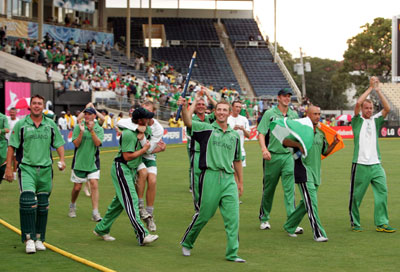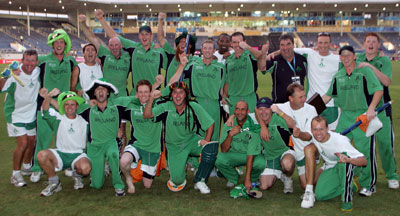On March 17, 2007, Ireland pulled off one of the greatest upsets in the history of the World Cup, as they trumped a shell-shocked Pakistani side by three wickets. Karthik Parimal looks back at the game, the repercussions and what it meant for the World Cup.
 March 17 is a day of celebration throughout the world, but more so in Ireland. St. Patrick's Day, Ireland's patron saint, is marked by the wearing of green, parades, feasting and, in some countries, copious consumption of alcohol.
March 17 is a day of celebration throughout the world, but more so in Ireland. St. Patrick's Day, Ireland's patron saint, is marked by the wearing of green, parades, feasting and, in some countries, copious consumption of alcohol.
On this day in 2007, the taverns in Ireland were brimming with supporters backing the Irish cricket team at the World Cup in West Indies as expectations soared since they eked out a tie against Zimbabwe in their opening fixture.
Pakistan, Ireland's rivals on the day, had been scratchy in the build-up to this tournament. The fact they'd been comprehensively beaten by West Indies in the first match of the World Cup did not help matters.
Hence, it was believed that the underdogs could give the established sub-continent giants a run for their money. Two teams donning green were set for a St. Patrick's Day showdown at Sabina Park, Jamaica. It was a crucial game for Pakistan as their hopes of progressing in the tournament could have been in jeopardy had they fumbled.
A horrendous start
Ireland's skipper Trent Johnston won the toss and sent Pakistan in to bat first in sunny conditions. In the first over of the innings, despite stroking a confident boundary past the bowler, Mohammad Hafeez fell to a beautiful away-going delivery pitched on good length by Dave Langford-Smith. A few balls later, Imran Nazir was dropped, but it had become certain by now that batting wasn't a cakewalk on this wicket.
That fact is confirmed when Younis Khan succumbed to Boyd Rankin — a thick outside edge landing into the hands of Andre Botha at slip. Nazir and Mohammad Yousuf then tried to arrest the slide, scoring 41 at just under five runs per over, but once the latter was caught at point off Johnston for 15, the unimaginable happened.
Inzamam-ul-Haq, captain of Pakistan, was caught two runs later in the slip by Eoin Morgan. Nazir soon followed, becoming the fourth victim to succumb in the area behind stumps, for 24. Shoaib Malik is quickly added to that column, caught by wicket-keeper Niall O'Brien off Kevin O'Brien for just nine.
In a matter of 16 runs, Pakistan had lost four wickets and were now reeling at 72 for six, well inside 25 overs. Dark clouds engulfed not just the Sabina Park, but also the Pakistan cricket team. The crowd went berserk, but this time it were the ones dressed in lighter green that were ecstatic. Their joy knew no bounds.
In came Kamran Akmal and a 31-run partnership with Azhar Mahmood ensued, but they too couldn't last long. At 105 for eight, Pakistan were in tatters. The tail wagged, albeit not for long, and in the 46th over, Umar Gul held out to deep midwicket, as the innings was announced closed at 132.
Ireland was now in a position to script one of the best St. Patrick's Day moments ever in Irish cricket. Elsewhere, Pakistan's neighbours and arch-rivals, India, had been bowled out for 191 against a lowly Bangladesh.
The chase
The Irish began their chase cautiously, meticulously placing the ball and avoiding rash hits against the expertise of Gul and Mohammad Sami.
 Jeremy Bray survived a close leg before wicket (lbw) appeal in Sami's first over, as television replays confirmed that the ball would certainly thud into the stumps. But two overs later, another appeal followed and, this time he was given the marching orders by umpire Brian Jerling, but Hawkeye had suggested that the decision was erroneous.
Jeremy Bray survived a close leg before wicket (lbw) appeal in Sami's first over, as television replays confirmed that the ball would certainly thud into the stumps. But two overs later, another appeal followed and, this time he was given the marching orders by umpire Brian Jerling, but Hawkeye had suggested that the decision was erroneous.
More blunders were to follow in due course of time. Sami swung the ball prodigiously by taking advantage of the overcast conditions. He struck Morgan plumb in front of the wicket as Ireland's score plummeted to 15 for two. However, William Porterfield and Niall O'Brien began the restoration process.
While the latter countered aggressively whatever was hurled at him by the seam bowlers, the former dropped anchor at the other end. In the 14th over, Azhar Mahmood's vociferous appeal against Porterfield was duly turned down and, television replays only added to Pakistan's mounting frustration.
Mohammad Hafeez was summoned to bowl his off-breaks, He responded by scalping Porterfield. The scoreboard read 62 for three as Botha walked out to bat. The frontline bowlers were reintroduced by Inzamam and Sami soon had the new batsman caught at short-leg; or so thought umpire Jerling.
Replays confirmed that the ball had come off the pads. The ball was miles away from the bat and there was hardly even a chance for lbw. As Rameez Raja rightly noted from the commentary box, acrobatics from the fielder had earned Pakistan a wicket.
Niall O'Brien kept pinching singles and occasionally dealt with boundaries, scoring 50 of Ireland's 75 runs. His brother Kevin O'Brien too stayed put at the other end, and together they look impenetrable for a brief period.
Questions were being asked as to why Inzamam had been persisting with spinners and part-timers even when it became evident that the only way his team could cross the finish line first was by picking up wickets, quickly.
Rain came pouring down in the 28th over, with Ireland needing just 52 runs from almost 23 overs, six wickets in hand. If there was no possibility of further play, Ireland would have made the cut owing to the Duckworth-Lewis method.
This is when most viewers would have switched over to the other match, only to find that Bangladesh had beaten India by five wickets. This was going to be a day of upsets, one felt. Play resumed with the Irish aiming at a revised target of 128 from 47 overs, and the O'Brien brothers cautiously steered the score to 108 for four, before Niall, in a hurried attempt to finish the game, tried one shot too many and ended up being stumped off Shoaib Malik by Kamran Akmal for a well-made 72.
One could call the approach irresponsible, but it was something you'd expect from an inexperienced unit that is on the brink of making history. Rao Iftikhar Anjum then struck twice in quick succession, and it now appeared as though Ireland's fairy-tale ride would come to an abrupt end. Many an Irish fan had his face anxiously buried in his palms; the dressing room didn't paint a happy picture either. From 108 for four to 113 for seven, the journey back to reality was swift.
However, to prevent a side from scoring 15 runs, especially with 72 balls and three wickets still remaining, was going to be arduous, even for an attack as formidable as Pakistan's. Johnston and Kevin O'Brien tentatively knocked the ball into the vacant spaces of the field and were within striking distance of the target in due course of time. It was in the 42nd over, bowled by Azhar Mahmood, that the scores were levelled.
The Pakistani dressing room, coach Bob Woolmer being the centre of attraction, looked shell-shocked. The Irish fans in the crowd were delirious. A slower ball from Mahmood followed, and it was hoicked over long-on by Johnston to send the supporters into frenzy. Ireland had beaten Pakistan by three wickets!
Almost the entire Irish dressing room ran out to the middle, where a long party that would certainly run late into the night had been kick-started. Pakistan had been knocked out.
What happened next?
Ireland became the story of the World Cup. St. Patrick's Day was celebrated with extra vigour, as taverns went dry in Dublin and other parts of the country. The team had extended their stay in the Caribbean.
Pakistan, understandably, drew flak from all corners. "We will ask for his [Nasim Ashraf's — Pakistan Cricket Board chief] resignation in the meeting which is due to take place before March 28. You lost miserably to a country like Ireland. There is nothing to compensate and the chairman must resign and go back to the United States," said Senator Mohammad Enver Baig to AFP.
Former Pakistani cricketer Sarfraz Nawaz said: "The captain, coach and the entire team should be held accountable. It seemed that the umpires also wanted that Pakistan should win, but the body language of the team reflected that they wanted to lose."
Pakistan's Coach Bob Woolmer died a day later, on March 18, 2007, under mysterious circumstances at the Jamaica Pegasus Hotel. It was first believed to be due to heart attack, but a murder investigation was later launched.
In a recent interview to Cricketcountry, former South African all-rounder Clive Rice was firm on his stance that Woolmer was murdered. "I have no doubt whatsoever. Around the time of Woolmer's death, there were occasions when the entire Pakistan team were all out caught [the game against Ireland being one of the cases in point]. All dismissals in an innings caught. What are the odds [of that happening]? It has happened very rarely in the history of the game," Rice stated, indicating that the mafia betting syndicates could have been behind the murder.
As for the World Cup, the Kensington Oval in Barbados played host to Bangladesh versus Ireland in the Super Eights instead of the touted India versus Pakistan. Ireland won that game by 74 runs.
Brief Scores: Pakistan 132 (Boyd Rankin 3 for 32, Andre Botha 2 for 5) lost to Ireland 133 for 7 (Niall O'Brien 72; Mohammad Sami 3 for 29, Iftikhar Anjum 2 for 29) by three wickets (D/L method).
